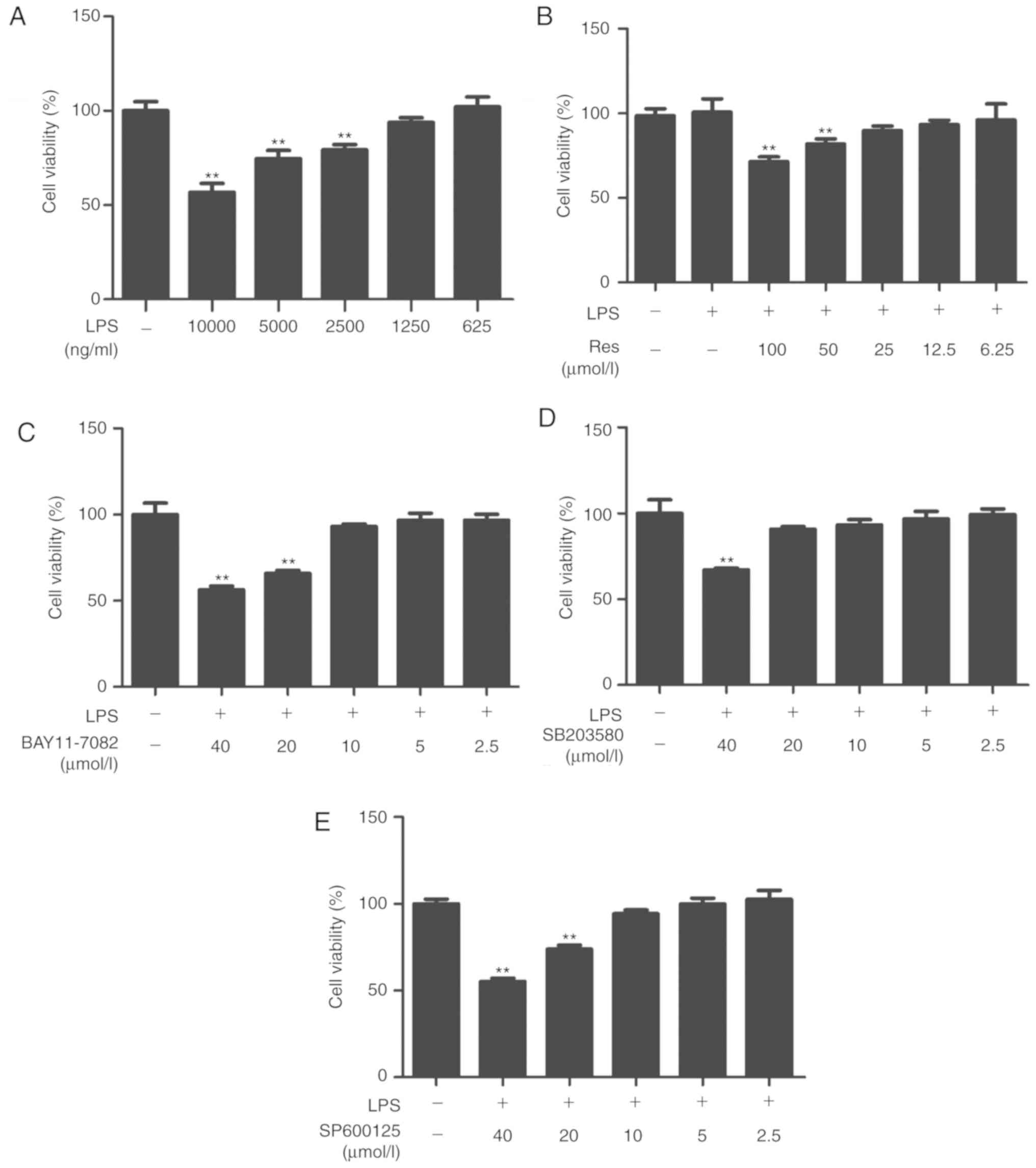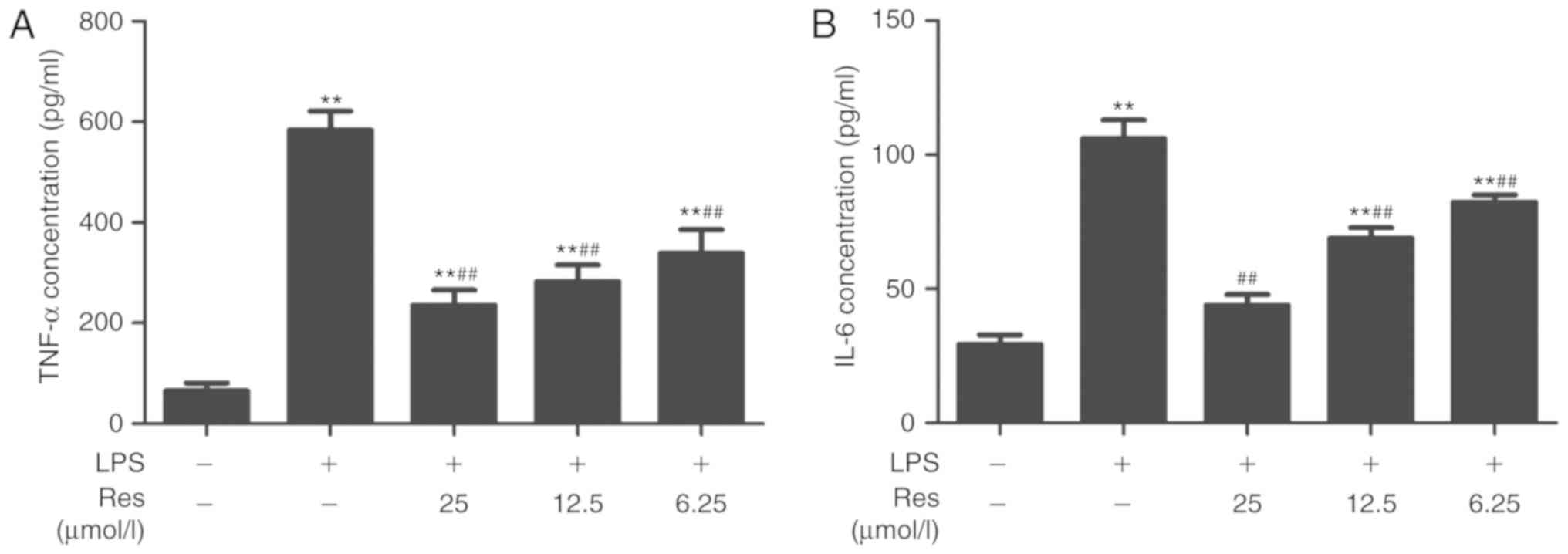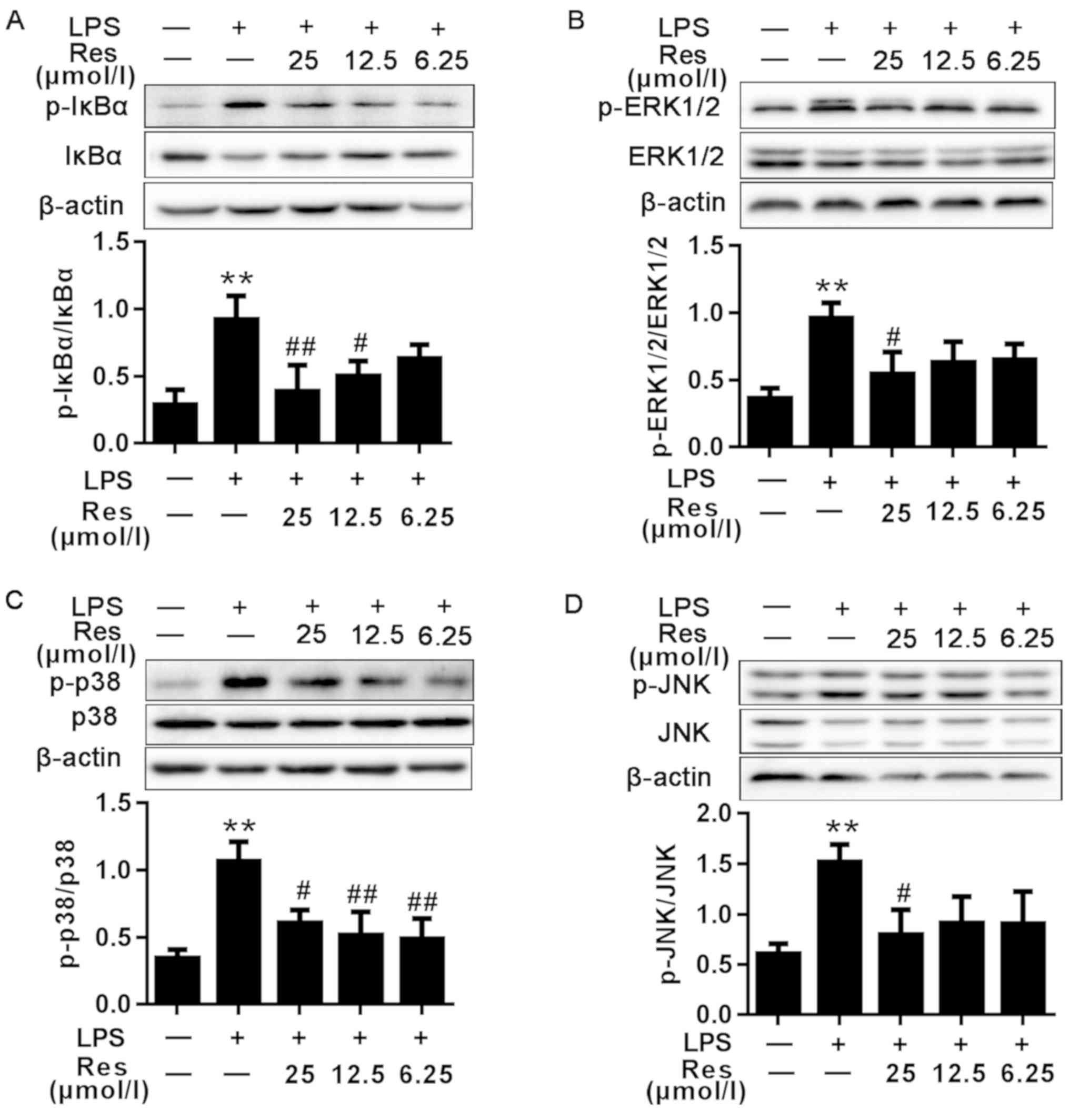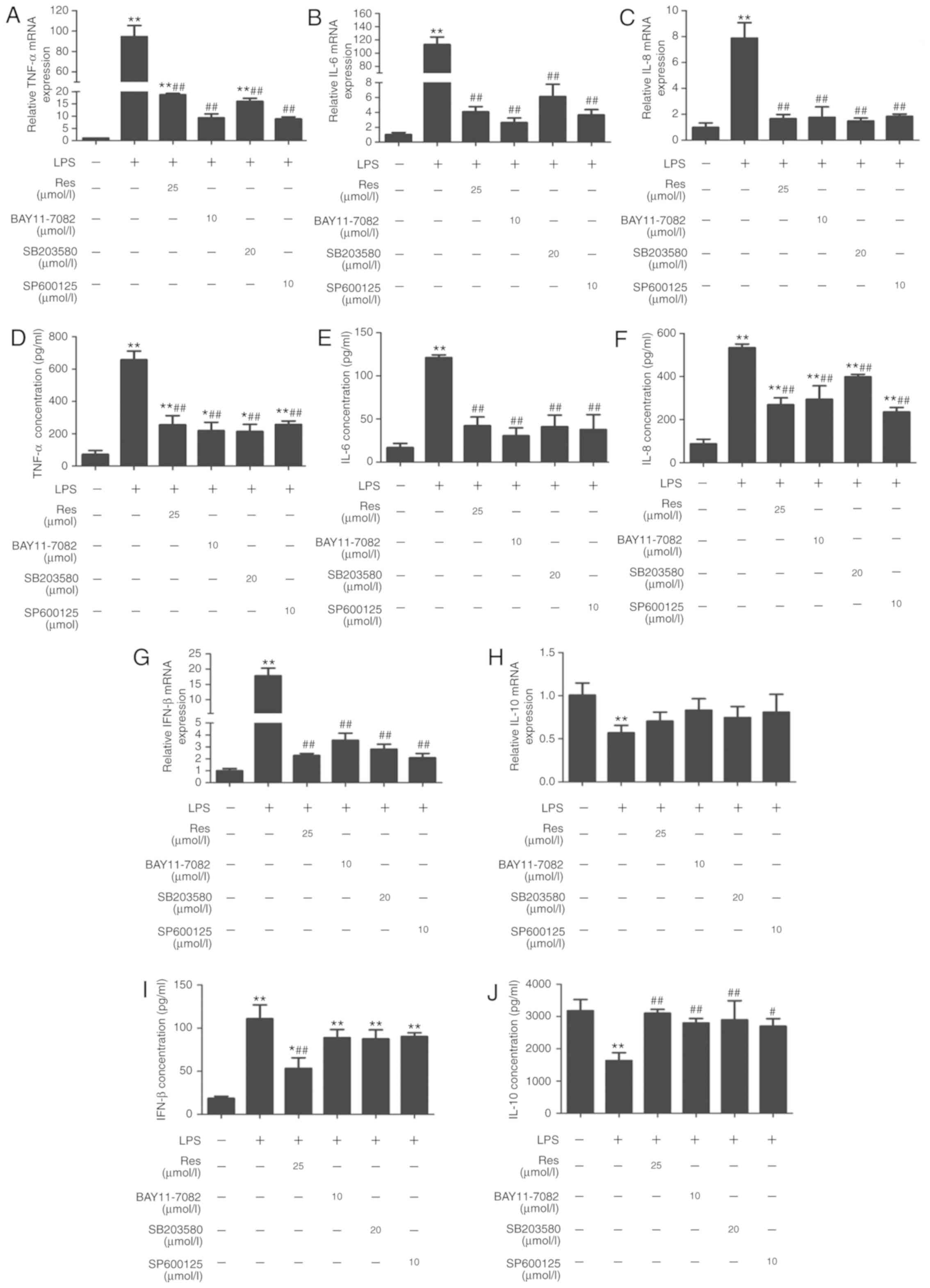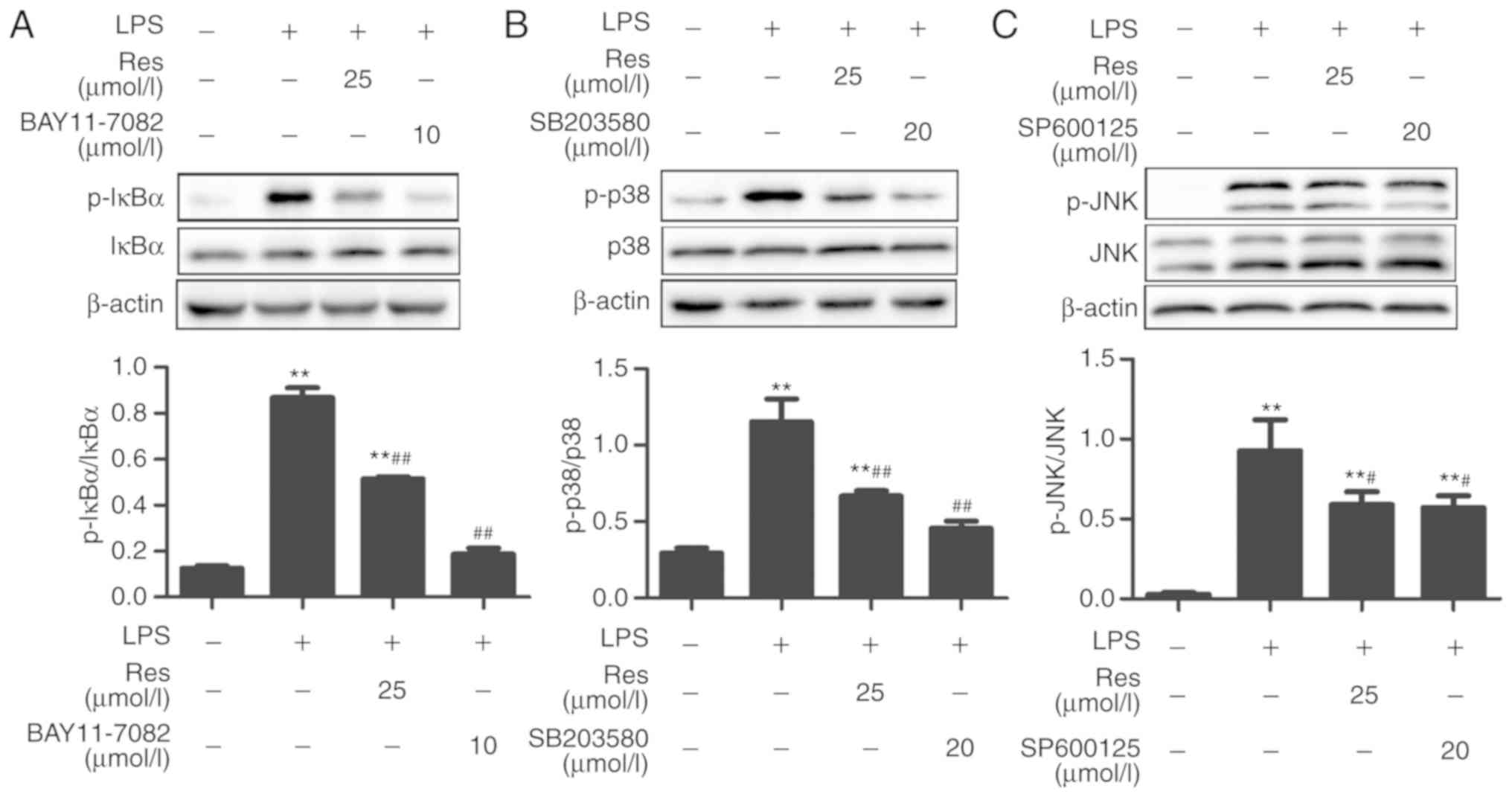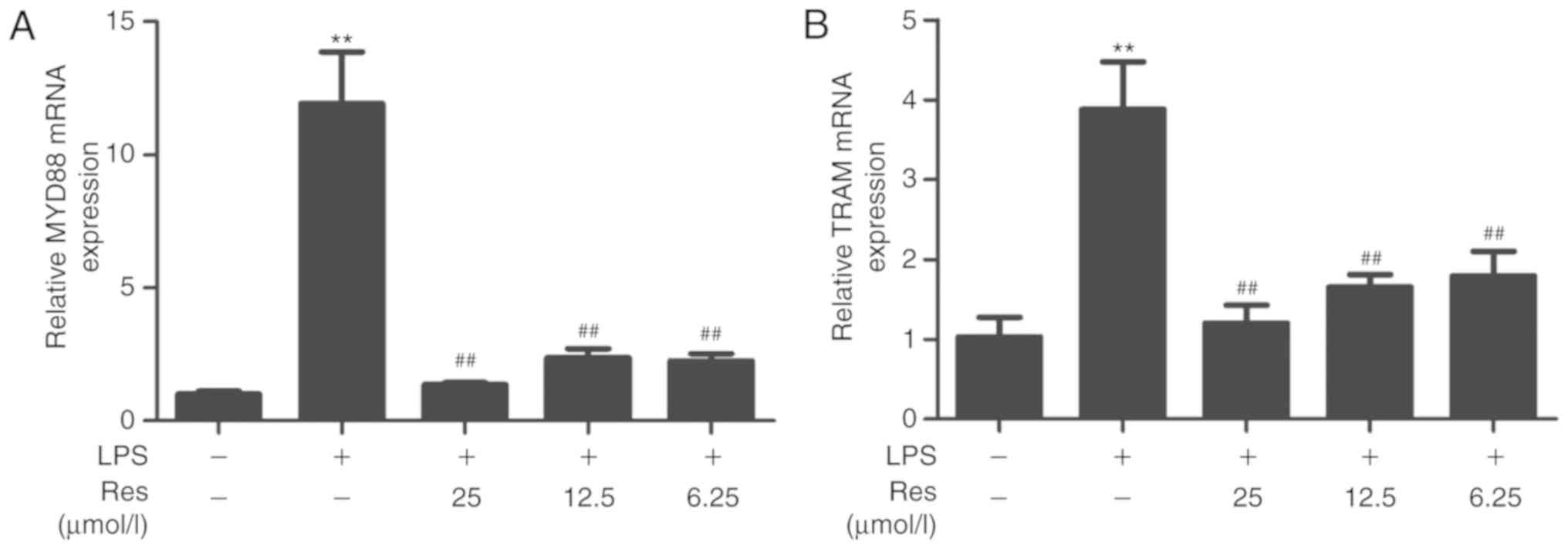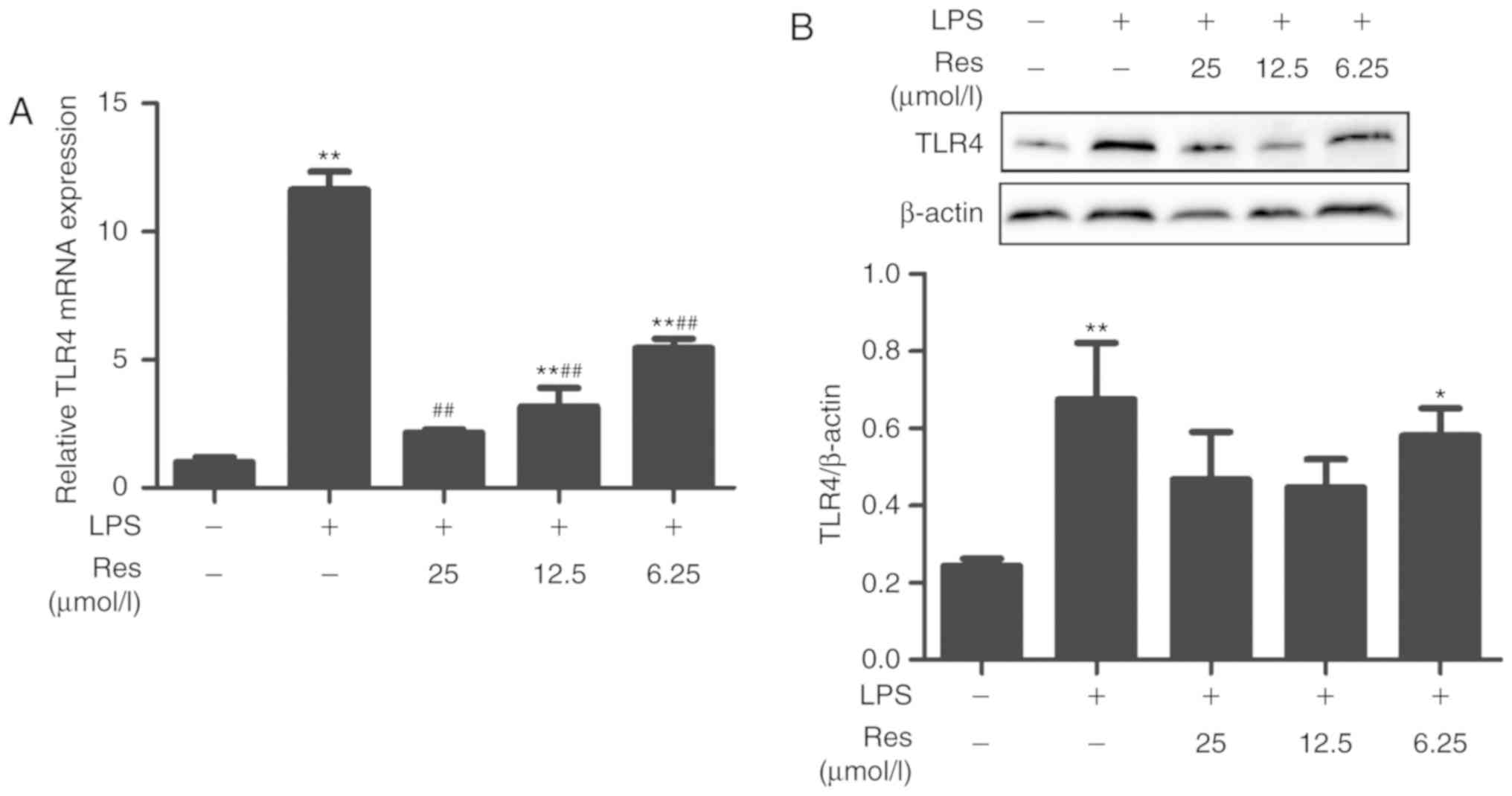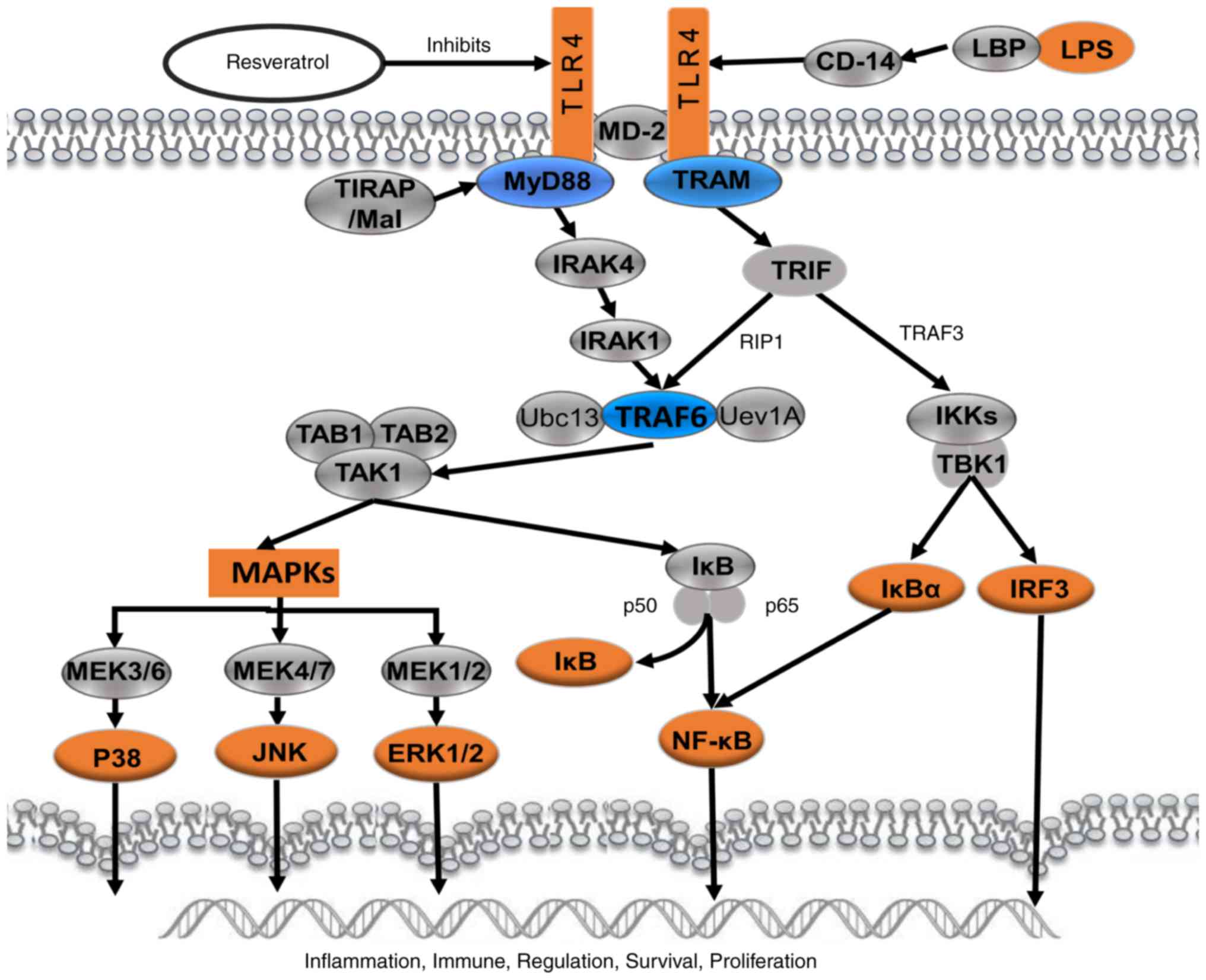|
1
|
Hu K, Yang Y, Tu Q, Luo Y and Ma R:
Alpinetin inhibits LPS-induced inflammatory mediator response by
activating PPAR-γ in THP-1-derived macrophages. Eur J Pharmacol.
721:96–102. 2013. View Article : Google Scholar : PubMed/NCBI
|
|
2
|
Wang YP, Wu Y, Li LY, Zheng J, Liu RG,
Zhou JP, Yuan SY, Shang Y and Yao SL: Aspirin-triggered lipoxin A 4
attenuates LPS-induced pro-inflammatory responses by inhibiting
activation of NF-κB and MAPKs in BV-2 microglial cells. J
Neuroinflammation. 8:952011. View Article : Google Scholar : PubMed/NCBI
|
|
3
|
Meng F and Lowell CA: Lipopolysaccharide
(LPS)-induced macrophage activation and signal transduction in the
absence of Src-family kinases Hck, Fgr and Lyn. J Exp Med.
185:1661–1670. 1997. View Article : Google Scholar : PubMed/NCBI
|
|
4
|
Zhou S, Chen G, Qi M, El-Assaad F, Wang Y,
Dong S, Chen L, Yu DS, Weaver JC, Beretov J, et al: Gram negative
bacterial inflammation ameliorated by the plasma protein beta
2-glycoprotein I. Sci Rep. 6:336562016. View Article : Google Scholar : PubMed/NCBI
|
|
5
|
Garay-Malpartida HM, Mourão RF, Mantovani
M, Santos IA, Sogayar MC and Goldberg AC: Toll-like receptor 4
(TLR4) expression in human and murine pancreatic beta-cells affects
cell viability and insulin homeostasis. BMC Immunol. 12:182011.
View Article : Google Scholar : PubMed/NCBI
|
|
6
|
Kim JJ and Sears DD: TLR4 and insulin
resistance. Gastroenterol Res Pract. 2010(pii):
2125632010.PubMed/NCBI
|
|
7
|
Wang G, Hu Z, Fu Q, Song X, Cui Q, Jia R,
Zou Y, He C, Li L and Yin Z: Resveratrol mitigates
lipopolysaccharide-mediated acute inflammation in rats by
inhibiting the TLR4/NF-κBp65/MAPKs signaling cascade. Sci Rep.
7:450062017. View Article : Google Scholar : PubMed/NCBI
|
|
8
|
Holthoff JH, Woodling KA, Doerge DR, Burns
ST, Hinson JA and Mayeux PR: Resveratrol, a dietary polyphenolic
phytoalexin, is a functional scavenger of peroxynitrite. Biochem
Pharmacol. 80:1260–1265. 2010. View Article : Google Scholar : PubMed/NCBI
|
|
9
|
Youn HS, Lee JY, Fitzgerald KA, Young HA,
Akira S and Hwang DH: Specific inhibition of MyD88-independent
signaling pathways of TLR3 and TLR4 by resveratrol: Molecular
targets are TBK1 and RIP1 in TRIF complex. J Immunol.
175:3339–3346. 2005. View Article : Google Scholar : PubMed/NCBI
|
|
10
|
Jakus PB, Kalman N, Antus C, Radnai B,
Tucsek Z, Gallyas F Jr, Sumegi B and Veres B: TRAF6 is functional
in inhibition of TLR4-mediated NF-κB activation by resveratrol. J
Nutr Biochem. 24:819–823. 2013. View Article : Google Scholar : PubMed/NCBI
|
|
11
|
Livak KJ and Schmittgen TD: Analysis of
relative gene expression data using real-time quantitative PCR and
the 2(-Delta Delta C(T)). Methods. 25:402–408. 2001. View Article : Google Scholar : PubMed/NCBI
|
|
12
|
Tseng CK, Lin CK, Chang HW, Wu YH, Yen FL,
Chang FR, Chen WC, Yeh CC and Lee JC: Aqueous extract of Gracilaria
tenuistipitata suppresses LPS-induced NF-κB and MAPK activation in
RAW264.7 and rat peritoneal macrophages and exerts hepatoprotective
effects on carbon tetrachloride-treated rat. PLoS One.
9:e865572014. View Article : Google Scholar : PubMed/NCBI
|
|
13
|
Tian WL, Jiang ZX, Wang F, Guo R, Tang P,
Huang YM and Sun L: IRF3 is involved in human acute myeloid
leukemia through regulating the expression of miR-155. Biochem
Biophys Res Commun. 478:1130–1135. 2016. View Article : Google Scholar : PubMed/NCBI
|
|
14
|
Guinn Z, Lampe AT, Brown DM and Petro TM:
Significant role for IRF3 in both T cell and APC effector functions
during T cell responses. Cell Immunol. 310:141–149. 2016.
View Article : Google Scholar : PubMed/NCBI
|
|
15
|
Kumari M, Wang X, Lantier L, Lyubetskaya
A, Eguchi J, Kang S, Tenen D, Roh HC, Kong X, Kazak L, et al: IRF3
promotes adipose inflammation and insulin resistance and represses
browning. J Clin Invest. 126:2839–2854. 2016. View Article : Google Scholar : PubMed/NCBI
|
|
16
|
Chen PG, Guan YJ, Zha GM, Jiao XQ, Zhu HS,
Zhang CY, Wang YY and Li HP: Swine IRF3/IRF7 attenuates
inflammatory responses through TLR4 signaling pathway. Oncotarget.
8:61958–61968. 2017.PubMed/NCBI
|
|
17
|
Rajaiah R, Perkins DJ, Ireland DD and
Vogel SN: CD14 dependence of TLR4 endocytosis and TRIF signaling
displays ligand specificity and is dissociable in endotoxin
tolerance. Proc Natl Acad Sci USA. 112:8391–8396. 2015. View Article : Google Scholar : PubMed/NCBI
|
|
18
|
Pham TH, Kim MS, Le MQ, Song YS, Bak Y,
Ryu HW, Oh SR and Yoon DY: Fargesin exerts anti-inflammatory
effects in THP-1 monocytes by suppressing PKC-dependent AP-1 and
NF-ĸB signaling. Phytomedicine. 24:96–103. 2017. View Article : Google Scholar : PubMed/NCBI
|
|
19
|
Lucas SM, Rothwell NJ and Gibson RM: The
role of inflammation in CNS injury and disease. Br J Pharmacol. 147
(Suppl 1):S232–S240. 2006. View Article : Google Scholar : PubMed/NCBI
|
|
20
|
Park MH, Gutiérrez-García AK and Choudhury
M: Mono-(2-ethylhexyl) phthalate aggravates inflammatory response
via sirtuin regulation and inflammasome activation in RAW264.7
cells. Chem Res Toxicol. 32:935–942. 2019.PubMed/NCBI
|
|
21
|
Zhao X, Cui Q, Fu Q, Song X, Jia R, Yang
Y, Zou Y, Li L, He C, Liang X, et al: Antiviral properties of
resveratrol against pseudorabies virus are associated with the
inhibition of IκB kinase activation. Sci Rep. 7:87822017.
View Article : Google Scholar : PubMed/NCBI
|
|
22
|
Li Y, Liu H, Xu QS, Du YG and Xu J:
Chitosan oligosaccharides block LPS-induced O-GlcNAcylation of
NF-κB and endothelial inflammatory response. Carbohydr Polym.
99:568–578. 2014. View Article : Google Scholar : PubMed/NCBI
|
|
23
|
Li D, Hu J, Wang T, Zhang X, Liu L, Wang
H, Wu Y, Xu D and Wen F: Silymarin attenuates cigarette smoke
extract-induced inflammation via simultaneous inhibition of
autophagy and ERK/p38 MAPK pathway in human bronchial epithelial
cells. Sci Rep. 6:377512016. View Article : Google Scholar : PubMed/NCBI
|
|
24
|
Huang C, Jacobson K and Schaller MD: MAP
kinases and cell migration. J Cell Sci. 117:4619–4628. 2004.
View Article : Google Scholar : PubMed/NCBI
|
|
25
|
Renda T, Baraldo S, Pelaia G, Bazzan E,
Turato G, Papi A, Maestrelli P, Maselli R, Vatrella A, Fabbri LM,
et al: Increased activation of p38 MAPK in COPD. Eur Respir J.
31:62–69. 2008. View Article : Google Scholar : PubMed/NCBI
|
|
26
|
Gaffey K, Reynolds S, Plumb J, Kaur M and
Singh D: Increased phosphorylated p38 mitogen-activated protein
kinase in COPD lungs. Eur Respir J. 42:28–41. 2013. View Article : Google Scholar : PubMed/NCBI
|
|
27
|
Lu YC, Yeh WC and Ohashi PS: LPS/TLR4
signal transduction pathway. Cytokine. 42:145–151. 2008. View Article : Google Scholar : PubMed/NCBI
|
|
28
|
Tambuyzer BR, Ponsaerts P and Nouwen EJ:
Microglia: Gatekeepers of central nervous system immunology. J
Leukoc Biol. 85:352–370. 2009. View Article : Google Scholar : PubMed/NCBI
|
|
29
|
Veres B, Radnai B, Gallyas F Jr, Varbiro
G, Berente Z, Osz E and Sumegi B: Regulation of kinase cascades and
transcription factors by a poly(ADP-ribose) polymerase-1 inhibitor,
4-hydroxyquinazoline, in lipopolysaccharide-induced inflammation in
mice. J Pharmacol Exp Ther. 310:247–255. 2004. View Article : Google Scholar : PubMed/NCBI
|
|
30
|
Kim L, Del Rio L, Butcher BA, Mogensen TH,
Paludan SR, Flavell RA and Denkers EY: p38 MAPK autophosphorylation
drives macrophage IL-12 production during intracellular infection.
J Immunol. 174:4178–4184. 2005. View Article : Google Scholar : PubMed/NCBI
|
|
31
|
Feng GJ, Goodridge HS, Harnett MM, Wei XQ,
Nikolaev AV, Higson AP and Liew FY: Extracellular signal-related
kinase (ERK) and p38 mitogen-activated protein (MAP) kinases
differentially regulate the lipopolysaccharide-mediated induction
of inducible nitric oxide synthase and IL-12 in macrophages:
Leishmania phosphoglycans subvert macrophage IL-12 production by
targeting ERK MAP kinase. J Immunol. 163:6403–6412. 1999.PubMed/NCBI
|
|
32
|
Ropert C, Almeida IC, Closel M, Travassos
LR, Ferguson MA, Cohen P and Gazzinelli RT: Requirement of
mitogen-activated protein kinases and IκB phosphorylation for
induction of proinflammatory cytokines synthesis by macrophages
indicates functional similarity of receptors triggered by
glycosylphosphatidylinositol anchors from parasitic protozoa and
bacterial lipopolysaccharide. J Immunol. 166:3423–3331. 2001.
View Article : Google Scholar : PubMed/NCBI
|
|
33
|
Monroe KM, McWhirter SM and Vance RE:
Induction of type I interferons by bacteria. Cell Microbiol.
12:881–890. 2010. View Article : Google Scholar : PubMed/NCBI
|
|
34
|
Weiss G, Maaetoft-Udsen K, Stifter SA,
Hertzog P, Goriely S, Thomsen AR, Paludan SR and Frøkiær H: MyD88
drives the IFN-β response to Lactobacillus acidophilus in dendritic
cells through a mechanism involving IRF1, IRF3 and IRF7. J Immunol.
189:2860–2868. 2012. View Article : Google Scholar : PubMed/NCBI
|
|
35
|
Cavalcanti YV, Brelaz MC, Neves JK, Ferraz
JC and Pereira VR: Role of TNF-alpha, IFN-gamma and IL-10 in the
development of pulmonary tuberculosis. Pulm Med. 2012:7454832012.
View Article : Google Scholar : PubMed/NCBI
|
|
36
|
Byun EB, Sung NY, Park JN, Yang MS, Park
SH and Byun EH: Gamma-irradiated resveratrol negatively regulates
LPS-induced MAPK and NF-κB signaling through TLR4 in macrophages.
Int Immunopharmacol. 25:249–259. 2015. View Article : Google Scholar : PubMed/NCBI
|
|
37
|
Zong Y, Sun L, Liu B, Deng YS, Zhan D,
Chen YL, He Y, Liu J, Zhang ZJ, Sun J and Lu D: Resveratrol
inhibits LPS-induced MAPKs activation via activation of the
phosphatidylinositol 3-kinase pathway in murine RAW264.7 macrophage
cells. PLoS One. 7:e441072012. View Article : Google Scholar : PubMed/NCBI
|
|
38
|
Vartanian KB, Stevens SL, Marsh BJ,
Williams-Karnesky R, Lessov NS and Stenzel-Poore MP: LPS
preconditioning redirects TLR signaling following stroke: TRIF-IRF3
plays a seminal role in mediating tolerance to ischemic injury. J
Neuroinflammation. 8:1402011. View Article : Google Scholar : PubMed/NCBI
|
|
39
|
Yang G, Chang CC, Yang Y, Yuan L, Xu L, Ho
CT and Li S: Resveratrol alleviates rheumatoid arthritis via
reducing ROS and inflammation, inhibiting MAPK signaling pathways
and suppressing angiogenesis. J Agric Food Chem. 66:12953–12960.
2018. View Article : Google Scholar : PubMed/NCBI
|
|
40
|
Chiang MC, Nicol CJ and Cheng YC:
Resveratrol activation of AMPK-dependent pathways is
neuroprotective in human neural stem cells against
amyloid-beta-induced inflammation and oxidative stress. Neurochem
Int. 115:1–10. 2018. View Article : Google Scholar : PubMed/NCBI
|
|
41
|
Santos SH, Andrade JM, Fernandes LR,
Sinisterra RD, Sousa FB, Feltenberger JD, Alvarez-Leite JI and
Santos RA: Oral angiotensin-(1–7) prevented obesity and hepatic
inflammation by inhibition of resistin/TLR4/MAPK/NF-κB in rats fed
with high-fat diet. Peptides. 46:47–52. 2013. View Article : Google Scholar : PubMed/NCBI
|
|
42
|
Meng Z, Yan C, Deng Q, Gao DF and Niu XL:
Curcumin inhibits LPS-induced inflammation in rat vascular smooth
muscle cells in vitro via ROS-relative TLR4-MAPK/NF-κB pathways.
Acta Pharmacol Sin. 34:901–911. 2013. View Article : Google Scholar : PubMed/NCBI
|
|
43
|
Zhang C, Lin G, Wan W, Li X, Zeng B, Yang
B and Huang C: Resveratrol, a polyphenol phytoalexin, protects
cardiomyocytes against anoxia/reoxygenation injury via the
TLR4/NF-κB signaling pathway. Int J Mol Med. 29:557–563. 2012.
View Article : Google Scholar : PubMed/NCBI
|
|
44
|
Cochet F and Peri F: The role of
carbohydrates in the lipopolysaccharide (LPS)/Toll-like receptor 4
(TLR4) signalling. Int J Mol Sci. 18:E23182017. View Article : Google Scholar : PubMed/NCBI
|
|
45
|
Wright SD, Ramos RA, Tobias PS, Ulevitch
RJ and Mathison JC: CD14, a receptor for complexes of
lipopolysaccharide (LPS) and LPS binding protein. Science.
249:1431–1443. 1990. View Article : Google Scholar : PubMed/NCBI
|
|
46
|
Ulevitch RJ and Tobias PS: Recognition of
gram-negative bacteria and endotoxin by the innate immune system.
Curr Opin Immunol. 11:19–22. 1999. View Article : Google Scholar : PubMed/NCBI
|
|
47
|
Jiang Q, Akashi S, Miyake K and Petty HR:
Cutting edge: Lipopolysaccharide induces physical proximity between
CD14 and Toll-like receptor 4 (TLR4) prior to nuclear translocation
of NF-kappa. J Immunol. 165:3541–3544. 2000. View Article : Google Scholar : PubMed/NCBI
|















